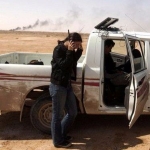Starting again in Japan
Tokyo -- Every time I move countries, there comes a moment when I find myself saying or doing something that previously struck me as totally alien.
In Tokyo, that moment came a few weeks ago, a year into my posting -- I seriously considered buying a medical face mask.
When I arrived here last year, after eight years in the Middle East, I was bewildered by the white masks that half my fellow commuters were wearing. My husband and I jokingly referred to them as Japanese niqab. But then there was a flu outbreak and I didn’t want to get sick, so I thought about buying a mask.
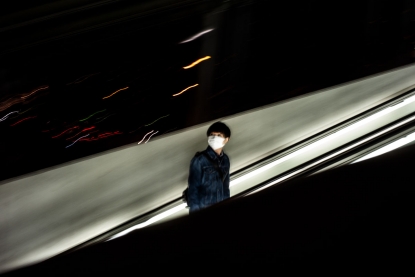 A man wearing a mask is using an escalator in Yokohama on November 22, 2018. (AFP / Martin Bureau)
A man wearing a mask is using an escalator in Yokohama on November 22, 2018. (AFP / Martin Bureau)I've moved around a lot -- with AFP alone I've been posted in the United States, Israel and Lebanon -- and every move comes with its own surprises. But this one has certainly been more jarring than most.
Japan was always going to be very different from the Middle East, and some of those differences have been the obvious ones, the cliches: it's so orderly! It's so clean! It's so polite!
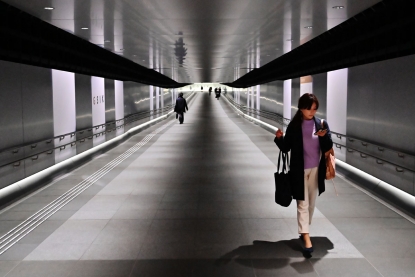 Women walk in a corridor of the train station of Ginza, Tokyo on March 18, 2019. (AFP / Charly Triballeau)
Women walk in a corridor of the train station of Ginza, Tokyo on March 18, 2019. (AFP / Charly Triballeau)But the things that interest me are the surprises, the differences that caught me off-guard, and the similarities that I didn't expect.
One of those is the quiet. Tokyo is a city of 13 million people, and I moved here from Beirut, a capital of a country of just four million.
But one evening as I headed towards a metro station in central Tokyo, I realised that if I closed my eyes I would have no way of knowing I was surrounded by hundreds of other commuters. There were no sounds to give them away. Not even a whiff of perfume or fast food to give me a clue.
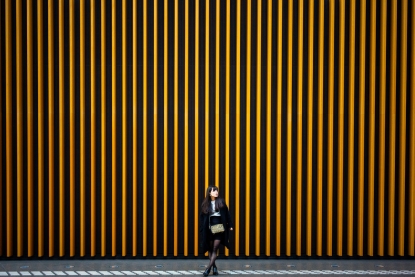 A woman waits at the Tokyo international forum in Tokyo on February 17, 2019. (AFP / Martin Bureau)
A woman waits at the Tokyo international forum in Tokyo on February 17, 2019. (AFP / Martin Bureau)For all the big differences, it's often the mundane things that mean the most.
My whole family has delighted in being able to drink water straight from the tap again, and my toddler never misses a chance to slurp from park water fountains.
Last Christmas was the first time in eight years we could send and receive cards -- we finally have a proper street address and access to a functioning postal service.
But for all these delights, most moves come with a measure of heartbreak, and leaving Lebanon after five years was not easy.
I worked with a close-knit team of wonderful journalists in Lebanon and Syria. Together we covered everything from the siege of Aleppo and chemical weapons attacks to the Islamic State group's chilling executions.
We survived by supporting each other, sharing laughter and also a lot of very, very good food. Saying goodbye to people who were not simply colleagues but also friends was wrenching.
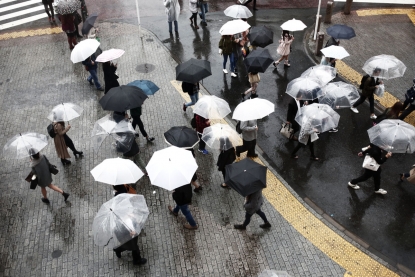 Tokyo, October, 2016.
(AFP / Behrouz Mehri)
Tokyo, October, 2016.
(AFP / Behrouz Mehri)So during my first months in Tokyo especially, I took heart from the things that surprised me by reminding me of Lebanon.
My toddler, for example, is doted on out of all proportion by total strangers here, just as he was in Lebanon.
They may not plant kisses directly on him as they did in Beirut, but in a country where interacting with strangers is the exception and not the rule, I've watched in astonishment as people press food and toys into his hands.
Both countries are also blessed with incredible cuisines, and there's a similar, righteous pride in local dishes and produce.
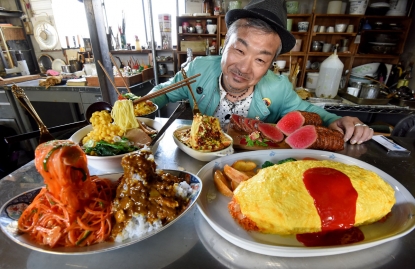 This picture taken on January 18, 2017 shows Norihito Hatanaka, president of Fake Food Hatanaka, introducing plastic food dishes at his company's studio in Tokorozawa, a suburb of Tokyo. (AFP / Toru Yamanaka)
This picture taken on January 18, 2017 shows Norihito Hatanaka, president of Fake Food Hatanaka, introducing plastic food dishes at his company's studio in Tokorozawa, a suburb of Tokyo. (AFP / Toru Yamanaka)In Japan, as in Lebanon, people wait eagerly for the season for a certain fruit or vegetable, dashing out to buy and enjoy them when the time comes. It's a connection to food production that isn't always the rule nowadays.
Of course not all the similarities are positive -- I've been surprised to find attitudes towards women in Japan that are depressingly familiar from the Middle East.
The top ranks of Japan's politics and business are overwhelmingly male, child-rearing is often regarded as a woman's domain, and at a work event recently, I realised the female waitstaff outnumbered the female attendees.
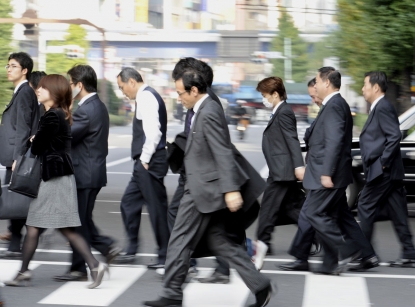 Lonely woman -- Japanese businessmen walk in Tokyo, November, 2008. with their head down in Tokyo on November 17, 2008. The top ranks of Japan's politics and business are overwhelmingly male.
(AFP / Yoshikazu Tsuno)
Lonely woman -- Japanese businessmen walk in Tokyo, November, 2008. with their head down in Tokyo on November 17, 2008. The top ranks of Japan's politics and business are overwhelmingly male.
(AFP / Yoshikazu Tsuno)Of course, I can't pretend the similarities outweigh the differences. I left Beirut after a lingering trash crisis that saw garbage piled up on the streets and burnt openly, creating a toxic blanket of air pollution that meant we kept our windows closed year-round.
In Tokyo meanwhile, there are no trash cans but the streets are always pristine. People carry their trash home and an army of cleaners not only sweeps streets but dusts the frames of advertising billboards and vacuums the subway stations.
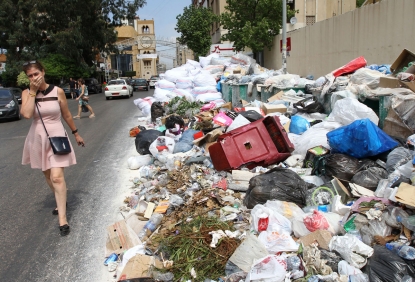 A woman holds her breath as she walks near a temporary garbage dump in the neighbourhood of Jdeideh, northeast of the Lebanese capital Beirut on September 1, 2016. Lebanon went through a garbage crisis caused by the closure of its main landfill the previous year. (AFP / Anwar Amro)
A woman holds her breath as she walks near a temporary garbage dump in the neighbourhood of Jdeideh, northeast of the Lebanese capital Beirut on September 1, 2016. Lebanon went through a garbage crisis caused by the closure of its main landfill the previous year. (AFP / Anwar Amro)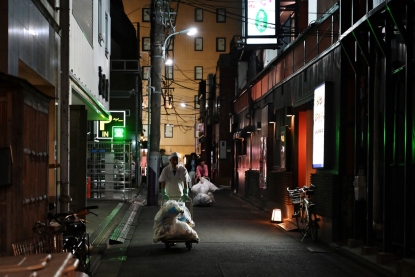 A man, working in a restaurant, pushes a trash cart in a street of the district of Ginza, Tokyo on March 18, 2019. (AFP / Charly Triballeau)
A man, working in a restaurant, pushes a trash cart in a street of the district of Ginza, Tokyo on March 18, 2019. (AFP / Charly Triballeau)
And after years of daily powercuts, it took months to get used to the idea that electricity in Japan really is available 24 hours a day.
Perhaps the biggest difference of all though is the sense of stability. In five years in the Middle East, I covered uprisings, counterrevolutions and wars in six countries.
When I told people in the region about my job, they understood inherently. Most of them had lived though similar things, or still were.
Japan is different. It's no stranger to tragedy because of natural disasters like the devastating 2011 tsunami. But conflict isn't something people here have worried much about in recent decades. The sympathetic shrugs I got in the Middle East are raised eyebrows and sharp intakes of breath in Japan, so I try to avoid the subject.
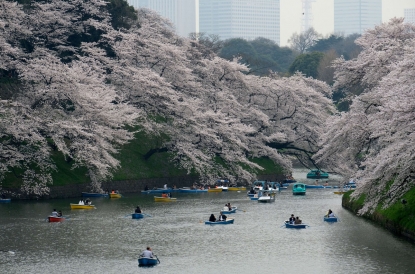 Visitors row boats past cherry blossoms in full bloom in the Japanese capital Tokyo on March 27, 2018. (AFP / Kazuhiro Nogi)
Visitors row boats past cherry blossoms in full bloom in the Japanese capital Tokyo on March 27, 2018. (AFP / Kazuhiro Nogi)That doesn't mean I've forgotten, and the past creeps back unexpectedly sometimes.
My apartment in Tokyo is near an amusement park with a giant rollercoaster. When the cars speed overhead, the wheels rumble and there's a whooshing sound as the passengers scream. It sounds uncannily like a fighter jet is above you and people are running away in terror. For months my heart stopped everytime I heard it.
But unlike in the Middle East, for now at least the chances of hearing an actual fighter jet are slim. I was struck one day as my son pointed with excitement at a helicopter in the sky by how many times I have seen children in the Middle East look at aircraft with terror rather than joy, knowing what a gunship or warplane can bring.
Unlike most people in conflict zones, I had the chance to move, and I picked Japan in part for the opportunity to cover different stories after years reporting on violence and displacement.
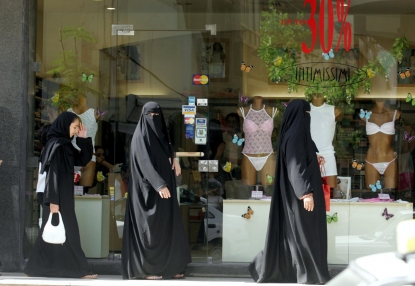 Arab Gulf women walk past a lingerie store on downtown Beirut, July, 2004.
(AFP / Joseph Barrak)
Arab Gulf women walk past a lingerie store on downtown Beirut, July, 2004.
(AFP / Joseph Barrak)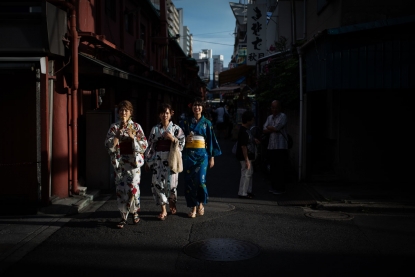 Women wearing kimonos walk along a street in Tokyo's Asakusa district on July 3, 2018. (AFP / Martin Bureau)
Women wearing kimonos walk along a street in Tokyo's Asakusa district on July 3, 2018. (AFP / Martin Bureau)
In Tokyo, politics sometimes feels almost non-existent, and the big items on our news agenda are other things -- growth or stagnation in the world's third largest economy, sports in the build-up to the Rugby World Cup and 2020 Olympics, culture in a place that prides itself on traditional arts.
So the learning curve has been steep on the professional front too. I know how to present my business card correctly -- with a slight bow, holding the top corners, text facing the recipient -- but others things are harder.
In much of the Middle East, we thought nothing of contacting spokespeople or even ministers by text message or Whatsapp, but Japan is one of the last redoubts of the fax machine.
The whirring sound of the machine warming up can herald the arrival of breaking news, and often interview requests or registrations can only be sent by fax.
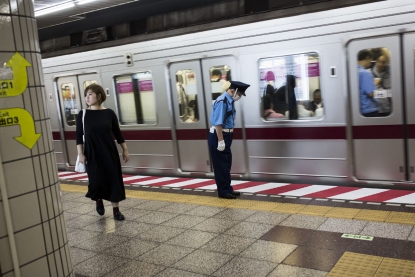 A Japanese subway employee bows next to a train after a safety check in a subway station in central Tokyo on October 12, 2016. (AFP / Behrouz Mehri)
A Japanese subway employee bows next to a train after a safety check in a subway station in central Tokyo on October 12, 2016. (AFP / Behrouz Mehri)But most difficult of all is my utter lack of Japanese skills -- I've never lived and worked somewhere without being able to speak the language.
In the office I can count on my excellent colleagues -- but I still stand in front of the television during ministerial speeches or breaking news as though I could somehow magically understand.
For now, most of the Japanese I'm acquiring comes through my toddler, who is in a Japanese nursery.
As a result, I'm left with a handful of vocabulary that is almost entirely useless outside the context of a three-year-old's daily life: hikoki -- airplane; gyunyu -- milk, uunchi -- poop.
But some of it might come in handy. He taught me "masku" recently -- that's the Japanese for those medical face masks.
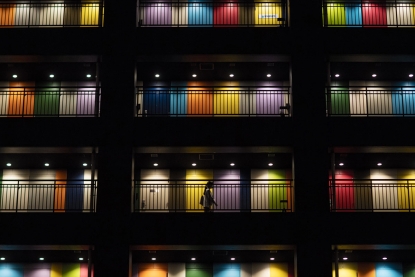 A woman walks along a passageway past appartments at a building in Tokyo on June 19, 2018. (AFP / Martin Bureau)
A woman walks along a passageway past appartments at a building in Tokyo on June 19, 2018. (AFP / Martin Bureau)


